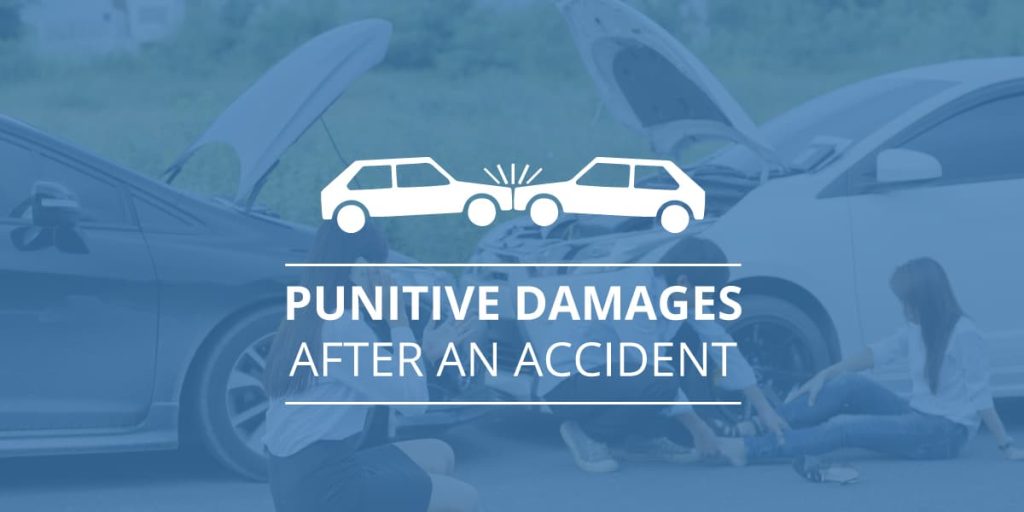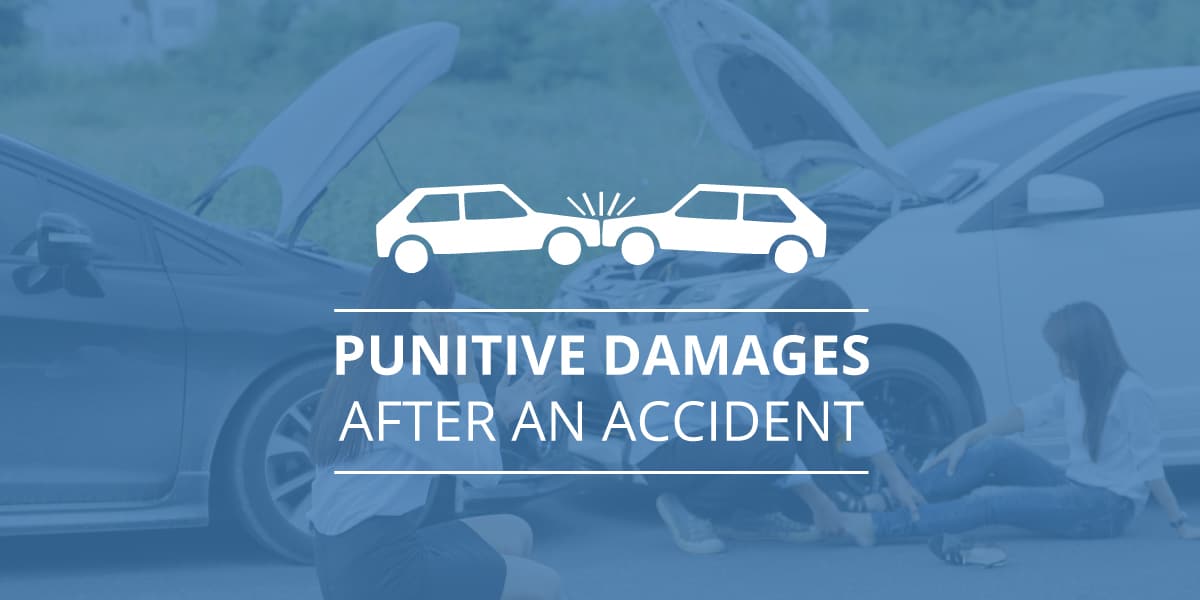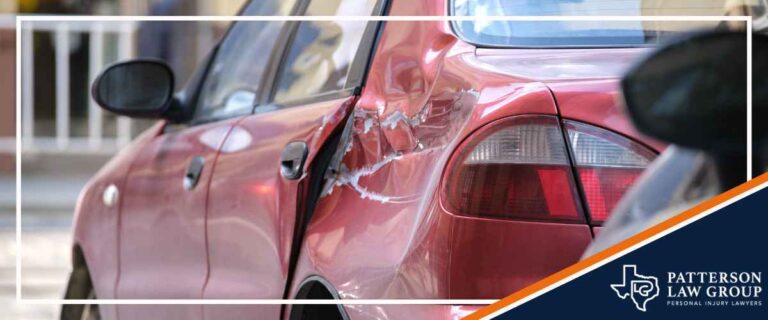Punitive damages, also called exemplary damages, are damages that may be awarded after an accident in a civil trial as a penalty for severe misconduct or gross negligence.
Punitive damages are intended to punish the person who has acted recklessly and are also meant to deter others from behaving in a similarly negligent way. Punitive damages are reserved for those guilty of the most egregious behavior.
Punitive damages are only awarded when the driver who caused the accident and injuries was extremely negligent and should have known ahead of time that his or her behavior could cause a great deal of harm to someone else. You and your attorney will need to gather clear, convincing evidence that the driver was aware of the risk but acted anyway or that their actions were motivated by an intent to harm.
Types of Compensation You May Be Entitled to
When you’ve been injured in an accident caused by the recklessness or negligence of another driver, you probably expect to be compensated for what the accident has cost you physically, mentally and financially. There are several different types of damages you may be able to collect to compensate you for any losses or personal harm you have experienced because of the accident.
Compensatory damages are the damages that you may be able to obtain if you were injured because of someone else’s error in judgment. Compensatory damages usually fall into one of two categories:
- Economic damages – Verifiable monetary losses fall into the category of economic damages. This would include past and future medical expenses, the cost to repair or replace your vehicle and loss of earnings, employment or business opportunities. Economic damages are intended to compensate a victim for actual financial losses.
- Non-economic damages – Losses that aren’t based on specific financial costs or losses are considered non-economic losses. This category includes compensation for pain and suffering, permanent disfigurement, injury to reputation, mental or emotional anguish and the loss of the ability to enjoy life. It may also include compensation for a spouse’s loss of companionship and affection.
Punitive damages go above and beyond economic or non-economic damages. They only apply when there were actual damages caused by an accident and the driver knew his actions had a high risk for potential harm. They are intended to punish conduct by individuals who may be considered the worst of the worst and to deter others from behaving in a similarly malicious manner.
Drivers’ Duty of Care
While compensatory damages cover compensation for most of the losses caused by an accident, punitive damages are intended to go over and above the categories of economic and non-economic damages. Although you could benefit from this additional compensation if a driver was particularly negligent or caused harm deliberately, the intention of awarding punitive damages is to punish the defendant rather than to reward the victim.
Drivers have a duty of care to other drivers to avoid doing anything that may cause harm to someone else. This means drivers are expected to follow the rules of the road, including the speed limit, stopping at red lights and avoiding driving while distracted or under the influence of substances. They’re expected to do what another reasonable adult would do under similar circumstances.
Incidents That May Be Considered Punitive Damages
Accidents are often caused by simple errors in judgment rather than maliciousness or gross negligence. Where is the line crossed between simply being distracted or careless and gross negligence? A person who is guilty of gross negligence displays complete indifference to the safety or rights of another person.
There’s a difference between being distracted enough to end up hitting the vehicle next to you and deliberately running into another vehicle because of anger and an intentional desire to cause harm. A deliberate intent to cause harm may lead to a lawsuit for punitive damages.
Other examples of incidents that may lead to a claim for punitive damages include:
- Running another vehicle off the road
- Participating in road races
- Driving at an excessively fast rate of speed, particularly through a school zone
- Driving under the influence of mind-altering substances, particularly when cited for this behavior previously
- Driving a vehicle known to be in need of maintenance, such as a driving a large truck known to have failing brakes
The burden of proof in punitive damages cases falls on the plaintiff. These damages are sought not just because of injury but because of exceptionally horrifying actions on the part of the defendant.
The Texas Damage Act
In Texas, there is a cap on the amount you can be awarded for punitive damages as determined by the Texas Damage Act. This law is contained in Chapter 41 of the Texas Civil Practices and Remedies Code. The cap was put in place so that juries wouldn’t arbitrarily impose punitive damages that were excessive and could lead to financial ruin.
Juries determine the number of punitive damages separately from the number of compensatory damages and must be unanimous in finding the defendant liable. These damages can’t exceed:
- Twice the amount of economic damages, plus an amount equal to non-economic damages. This amount can’t be higher than $750,000
- $200,000 (whichever is greater)
Justice After Serious Injuries or Wrongful Death
Being in any car accident can be extremely traumatic and can lead to injuries that can completely alter the course of your life. While most accidents happen because of a momentary lapse in judgment on the part of one or more drivers, it can be even harder to deal with accidents that occur because of deliberate actions that involve indifference, intent, and irresponsibility.
Even though the Texas Damage Law imposes a limit on the number of punitive damages that can be awarded in this type of accident, those that have been victimized by recklessness that was malicious or intentional deserve the maximum amount of compensation possible. These victims can obtain some justice for serious injury or wrongful death above and beyond compensatory damages by being awarded punitive damages and may derive some comfort in knowing the perpetrator had some punishment for his or her actions.
Are You Entitled to Punitive Damages?
The law allows for punitive damages when the defendant’s conduct is very reckless or intentional. A jury would have to consider a variety of factors such as whether the defendant was aware of the dangerous nature of his conduct and whether he has the ability to pay. Punitive damages are awarded only in a small percentage of personal injury cases and there has to be very convincing evidence. In order for you to be awarded punitive damages, the actions of the other driver would have had to be particularly horrible, deliberate and deserving of punishment.
The best way to know for sure whether punitive damages are applicable in your case is by consulting an expert in the field of personal injury law. Patterson Law Group offers a free case evaluation at no cost to you unless we win. Get in touch with us by filling out the form on our contact page. A member of our legal team will be in touch very soon to set up your free case evaluation and answer any questions you may have.







